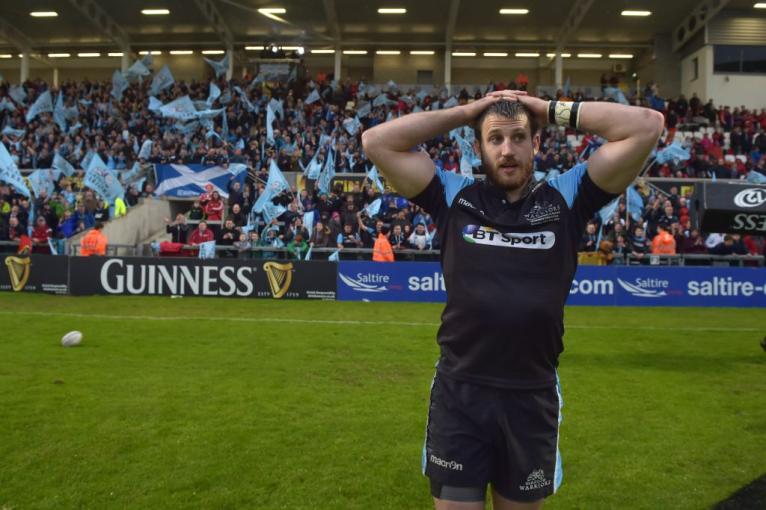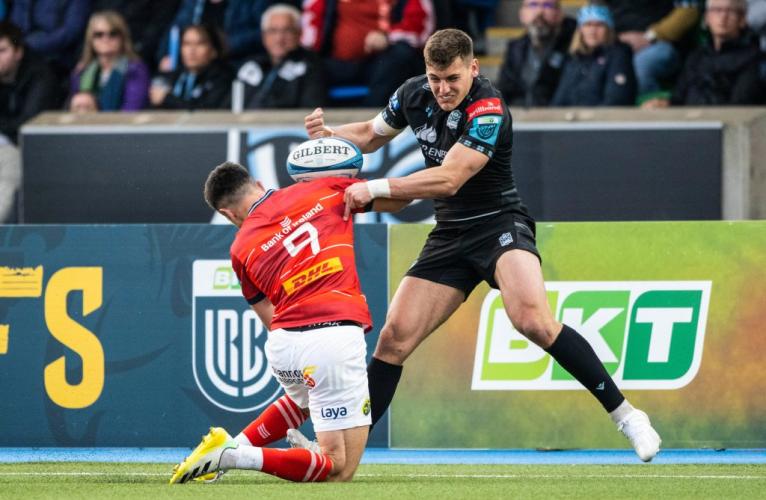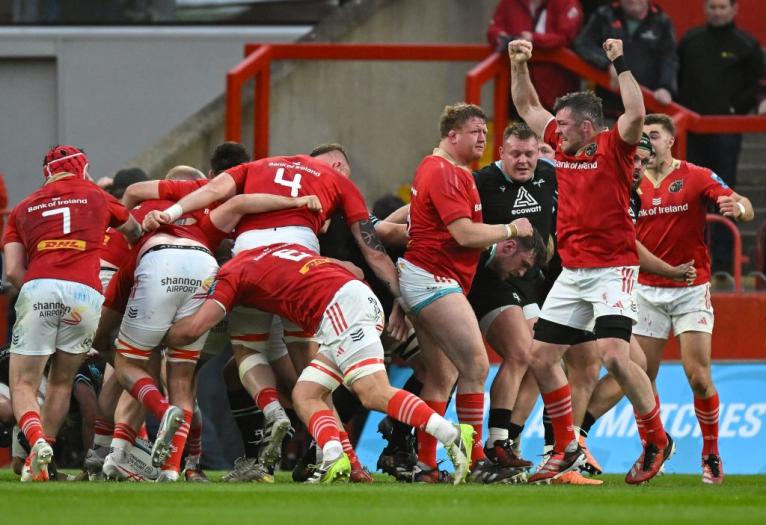In the age of contrived hype and marketing spin, genuine rivalries are precious. The URC is a competition spread over such vast geographical distances that beyond local feuds, cross-border angst is harder than usual to stoke. Travelling to away matches is often impractical and expensive. A Leinster supporter is unlikely to encounter a Zebre Parma fan in the office on Monday morning. Nor might Bulls and Edinburgh fanatics share a pint down their local on a Friday night.
The league remains vibrant and brilliantly competitive, and it has served up a tantalising international grudge match in the semi-finals. A duel with authentic acrimony.
The Munster-Glasgow rancour set in around the start of the previous decade, a time when the Warriors began to show their champion credentials. There were a series of titanic battles fought by some of the biggest characters either side has known. On the Munster end, the totem Paul O’Connell, the hot-stepping genius Simon Zebo, whip-holding Conor Murray and, of course, the irrepressible War God himself, Peter O’Mahony. For O’Mahony, read Ryan Wilson, Glasgow’s ringleader. Gregor Townsend could wield a motoring Stuart Hogg and a precocious Finn Russell grinning from ear to ear in those days. The Fijian sprite Niko Matawalu did largely whatever he pleased with the ball. Without it, he was accused, cited and cleared of biting Donncha O’Callaghan in 2013.

The Warriors put Munster out to reach their first final in the old Pro12 a decade ago. They lost to Leinster, but their glory arc culminated in a dismantling of the red province in the following year’s showpiece. A day when Leone Nakarawa ran through Munster like a colossus and the result was never in doubt beyond the opening thirty minutes. It remains Glasgow’s finest hour and Scottish rugby’s only major club trophy.
The venom festered. In the weeks following the horrendous passing of Anthony Foley in 2016, Munster hosted Glasgow at Thomond in a Champions Cup pool match. Whatever opposition fetched up in Limerick that afternoon could have fielded fifty men and it would not have been enough. As it happened, Munster did not even need fifteen. Keith Earls was sent off for a tip-tackle on Fraser Brown in the opening minutes. Munster, playing like demons, scarcely missed a beat. They played for their coach and their province and their people and walloped Glasgow 38-17.
If Earls, who has spoken with such bravery about his battle with bipolar disorder, was too amped up by trauma and emotion, it would be grossly unfair to criticise him. But he would make few Glaswegian pals in the aftermath by suggesting Brown had milked the tackle.
The return fixture at Scotstoun three months later smouldered. Murray was incensed when a spree of Glasgow players torpedoed him in the act of box-kicking. He felt this a grubby and dangerous ploy to target his standing leg – “which we were”, Wilson would later confirm on a RugbyPass podcast. Townsend said he’d “heard a few comments out of Munster. Obviously the pressure we put on them, they didn’t enjoy.”
Congratulations to @ShaneDaly96 on winning the 2023/24 #URC Ironman award 💪
The award recognises the player who played the most minutes of the regular season with Daly missing just 10 minutes of Munster’s 18 games 🤯
See full details ⤵️#URCAwards #SUAF 🔴
— Munster Rugby (@Munsterrugby) June 12, 2024
All of this juiciness has been tossed into the simmering conflict between the two nations. Off the field, the Irish union were aggrieved Scotland did not back their bid to host the 2023 World Cup. “Scotland wanted to go for the money,” lamented then-chief executive Philip Browne when it came to light the Scots had voted for France.
But the truth is, Ireland have had their foot wedged on Scottish throats for an age now, so unrelenting has their dominance of the fixture been. They mangled Scotland in each of the past two World Cups and have not lost to them in ten matches since 2017. They remain the only Six Nations opposition Townsend has yet to conquer.
The Scots believe Ireland see them as soft and mouthy. All talk and no trousers. There have been annual grenades launched on Irish television by former coaches Eddie O’Sullivan and Matt Williams. Some of these barbs are outlandish – in Williams’ case, perhaps the axe-grinding of a man with the worst record of any Scotland coach in the professional era – but others are not without merit. Nobody in the Scotland camp has heralded their impending Grand Slam from the rooftops, but nor have they garnered anything like the consistency of performance their talent demands. Ireland, mesmerising and machine-like, had their measure over and over and over again.
What of the recent club shootouts? Last year, Franco Smith’s first in the Scotstoun hosteat, the South African took his team to Thomond and filleted Munster in as a ruthless an away showing as any Glasgow have delivered since Townsend’s time. Yet barely six weeks later, when you could argue it really mattered, Munster comprehensively shut down Smith’s sparkling attack and famed maul. Typically, that game was not without incident. Tom Jordan whacked Murray at head height and was sent off 26 minutes in. Glasgow were the better team up to that point. Jordan’s dismissal and a six-two bench with no recognised fly-half neutered them.

Munster went on and on, snowballing momentum and gaining belief. They dynamited Fortress Scotstoun, then did Leinster in the Aviva with Jack Crowley’s drop goal, before a fabulous John Hodnett try decked the Stormers in Cape Town and sealed the URC crown. Such a run – from fifth place to the silverware via Glasgow, Dublin and South Africa – may never be replicated.
Munster have the big-game pedigree Glasgow lack. They have home advantage, which they will retain for the final should they get there. Glasgow’s victory last March was their first at Thomond in nine years. And Munster have form on their side too. A solitary defeat in their past 11 matches, coming at Franklin’s Gardens against English champions Northampton Saints. In that time, they’ve been to Swansea, Llanelli, Edinburgh, Johannesburg and, notably, Pretoria, and come away with wins. They’ve taken care of the Welsh regions and their Irish rivals, weathered a storm in the Scottish capital and claimed the scalp of Jake White’s fully loaded Bulls at altitude. They haven’t lost at home since January where only Northampton, again, and Leinster, in a 9-3 slugfest, have beaten them this season. Glasgow came to Musgrave Park in November and shipped 40 points.
The visitors’ ledger is patchier. Home and away wins over Zebre, the former a fortnight ago particularly clunky. A disastrous second half in Johannesburg when the Lions feasted on their mistakes and snatched away hope of a more favourable seeding. Putting the Stormers away in Saturday night’s quarter-final was a huge fillip.
It was psychologically dear, too, for a team which had dazzled under Smith with little tangible reward. The capitulation in last year’s Challenge Cup final. The unravelling after Jordan’s red card in the URC quarter. The failure to land a killer blow on Harlequins with a three-point advantage on the scoreboard, Joe Marler in the sin bin and red-zone possession in the final 15 minutes a few months back.
There’s a wider debate to be had about the whole of Scottish rugby when it comes to pressure matches and fraying performances but if Glasgow keep winning, we can start to consign that troublesome institutional notion to the scrapheap.
None of the players are naïve to this backdrop. On the same podcast as Wilson back in 2020, Zebo revealed the thermonuclear reaction among his teammates when they learned he was following the Glasgow flanker on Instagram.
“I had a screenshot sent into a WhatsApp group of a few players that I can’t name. Three or four of them were like literally, ‘What the f*** is this? You’re following this clown’. I got a bit of heat for that and I had to immediately unfollow you, but I followed you again recently.”

Here’s Peter Wright, former Scotland prop and forthright pundit on the BBC’s Scottish Rugby Podcast: “You want to get a little bit of revenge [for last year] but that’ll care of itself because they hate us – Glasgow and Munster hate each other massively,” he said. “That’s gone on for years.” Hooker Brown, who recently announced his retirement, told the same outlet “what’s coming is as big as any international they’ve played.”
Honestly, rugby needs more of this. The storylines and the intrigue and the sparks. The perma-scowl of O’Mahony versus the wide-eyed thirst of Jack Dempsey on the hoof. The terriers Craig Casey and George Horne scrapping about the rucks. Huw Jones and Antoine Frisch scorching up the midfield channels. Jordan, perhaps with a point to prove, against Crowley, who sits now on Johnny Sexton’s throne. Steam pouring from nostrils at the first scrum. No doubt some grappling off the ball. And all of us off the pitch lapping it up by the mouthful.
Our sport can be too vanilla, afraid of stirring a fire which might singe a rugby value here and there. Rivalries and the anticipation they engender are vital sustenance for a competition, particularly a relatively new one with so many nations so far apart.
So let us embrace the hostility and the needle on Saturday. Thomond will be seething and fizzling with energy. It has few peers among the great club rugby amphitheatres. There will be enmity and history, resentment and umbrage and at the end, a finalist anointed. What a show.


It’s probably the only match up with any real edge verging into nastiness about it in the URC. Its origins though are more bygone than current and they originated with Mssrs Wilson & Matawalu, but mostly Wilson. The game that (allegedly) had some real ‘bite’ to it saw Matawalu at the centre of the infraction until he utilised his speed to good effect up the tunnel, with a Munster posse led by O’Connell desperate to get their hands on him.